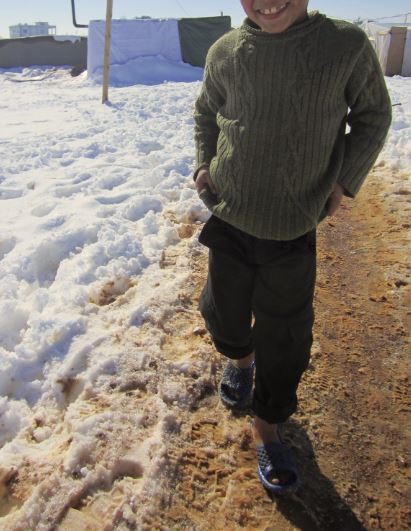
Oxfam’s Senior Humanitarian Policy Adviser, Anna Chernova uses her own experiences as a refugee to reflect on how Lebanon can tackle inequality and protect the rights of millions of Syrians.
Back in 2015, I remember standing in a damp, soaked tent in Lebanon’s Bekaa valley, watching kids run around in the snow in slippers. Their parents looked on in desperation because they knew they would never be able to dry them off, or treat their children properly if they (inevitably) got sick. In response to the look on my face, a Syrian refugee mother said to me: ‘But still better than waiting for the bombs to drop or armed men to come for their brothers, fathers and sons; to never see them again’.
Four years on, we are looking at another winter, another storm, and more fundraising.

The violence that drove refugees from Syria is deliberate. The poorest, most vulnerable among them are particularly at risk. Like elsewhere, refugees tend to settle in poorer communities – where they could afford rent and services. This is also a decision – though not one where refugees have much agency. The longer crises last, the more they can add to social tensions in such communities. Where resources are already scarce, the poorer among the Lebanese and Syrians find themselves competing for essential services. The lack of financial support to poorer communities (municipalities) of Lebanon from the government in Beirut is also a decision. It may be an informal, opaque decision by an elite-captured, highly unequal political establishment – but it is still a decision.
This situation is not exclusive to Lebanon. Most people on the move tend to drift toward communities they can access, and where they can afford housing and services. This comes with a high cost – both for those displaced by conflict and for those whose communities they come to call their temporary homes.
The poorer Lebanese municipalities tend to host the most refugees. Political deadlock, elite capture and corruption has meant that those municipalities do not get enough attention or cash from the capital. The international community is heavily involved in trying to fill the gap, through the UN-Lebanon crisis response mechanisms, including with direct support to municipalities.
I was a child when my family left the USSR and received asylum in the US. As new arrivals in the poorer communities of racially-divided, wealthy Boston, I felt parallels when I visited the snow-capped, makeshift, damp tents in the Bekaa valley. They seemed a world away from the bustling, construction-hub of luxury Beirut. The inequalities are striking. There are many differences between being a Soviet refugee in 1990s Boston and a Syrian in today’s Lebanon. The soggy tents are one – the refugee rights another. We came to the US with nothing, but we had the right to protection (including documentation), the right to claim housing and social services, when we needed it. And if we ran into trouble, the right to due process, and police protection. We had the right to become citizens of a country we came to call home: the right to a future.

Lebanon is a small country where sectarian structures are central to the form of government. This, combined with historical tensions with Syria and the Palestinian refugees already in Lebanon for generations, means that the ‘rights’ of these refugees to housing, water, food, education, livelihoods and integration are up for constant debate in a highly fragile, sensitive political environment.
It’s not all bad news. The international community has learned a lot during the Syria refugee response. There is greater emphasis on supporting local communities as well as refugees (to avoid inadvertently stoking social tensions and grievance over who gets aid and who doesn’t). And the aid community has worked hard to increase focus on governance in Lebanon, and to engage local and national authorities on aid effectiveness, inequalities and rights. We are keen to help Lebanon look ahead to inclusive development and prevent a recurrence of conflict.
We need to ask more questions about how we can better support Lebanon to govern in a way that distributes wealth more equally, boosts accountability and active citizenship. And doesn’t leave those who are not Lebanese shivering in the cold.